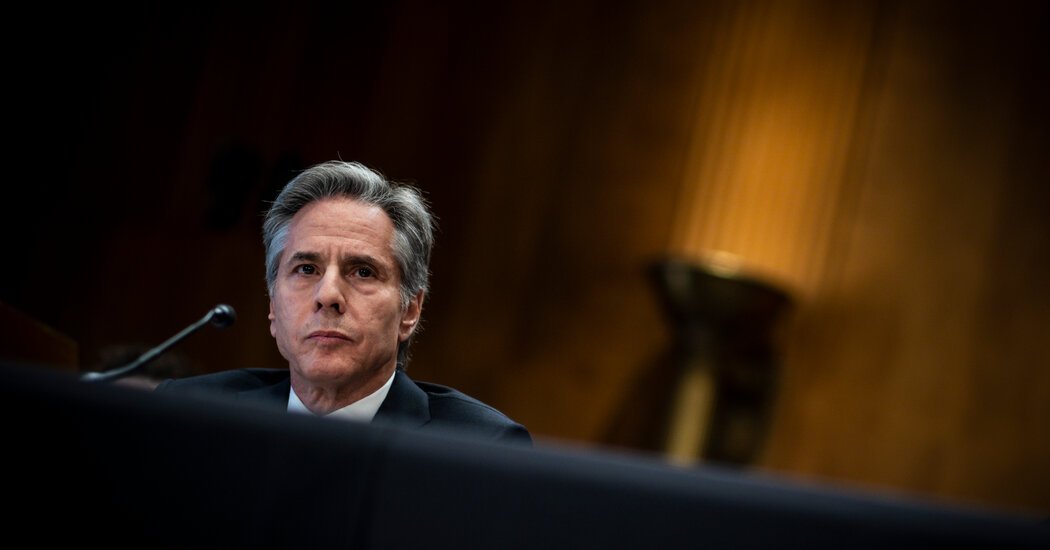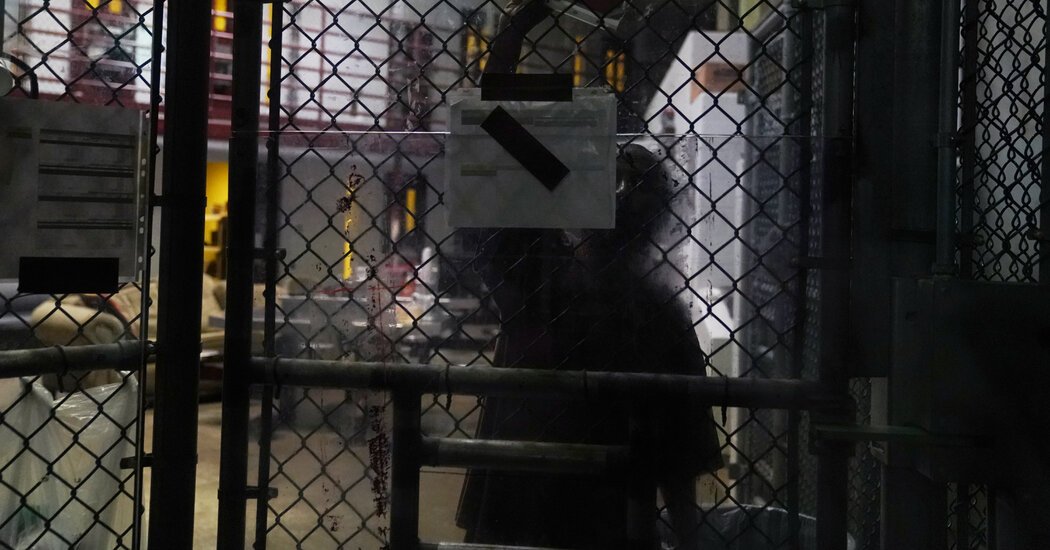Secretary of State Antony J. Blinken makes his long-delayed visit to China beginning Sunday in the hope of slowing the downward spiral of relations between Beijing and Washington. But China’s increasingly assertive, at times outright hostile, stance suggests that the visit will be as much about confrontation as détente.
In China’s telling, the United States is a declining, hegemonic power that is seeking to cling to its dominance in China’s backyard and provoke Beijing over its claim on Taiwan, the self-governed island democracy. The country’s leader, Xi Jinping, accuses the United States of leading other countries in a joint campaign to contain China militarily, diplomatically and technologically. Even as Beijing has agreed to talk, it has also signaled that it is braced for conflict, seeing little chance of — and potentially little use in — a real thaw.
“China has thrown away its illusions,” said Zhu Feng, a professor of international relations at Nanjing University. “It’s less and less confident in the idea that China-U.S. relations could improve because of Chinese efforts.”
Mr. Xi has recently warned officials to be prepared for “extreme scenarios,” suggesting that external threats are multiplying. Chinese military vessels have maneuvered close to American warships and planes, in what American officials have called unnecessary provocations. And in a phone call this week, China’s foreign minister told Mr. Blinken it was “clear who bears responsibility” for deteriorating bilateral relations.
More broadly, Mr. Xi has been fixated on national security during his decade in power, emphasizing the need for self-reliance and suggesting that existential threats to the Chinese Communist Party’s rule are ubiquitous. Rising nationalist sentiment in China — often stoked by the authorities — cheers on Beijing’s hawkish foreign policy.
Washington faces its own domestic pressures not to appear soft; a tougher approach to China has become a rare area of bipartisan consensus. President Biden, even as he has declared his desire for dialogue, has described China as America’s greatest geopolitical challenge. The United States has issued a barrage of sanctions on Chinese officials and companies, and tried to cut off Chinese access to critical technology globally. Some in Congress have accused the administration of still being overly accommodating to China, such as when it downplayed recent reports that China was building a spy station in Cuba.
With both sides staking out seemingly intractable positions, few officials and experts harbor hope of any major breakthroughs from Mr. Blinken’s visit, the first by an American secretary of state since 2018. It was unclear whether he would meet with Mr. Xi.
At the heart of Beijing’s chilly posture toward Mr. Blinken’s visit is its claim that American overtures are insincere, and its treatment of China unjust. When Mr. Blinken postponed his previously scheduled visit in February, over a Chinese spy balloon, Beijing called it an overreaction. China has also dismissed American accusations that it was considering arming Russia in its war in Ukraine, and cited American efforts to rally allies to restrict technology exports to China as proof of a containment campaign.
In an editorial last week, The Global Times, a party tabloid, said the United States was “just performing” when asking for engagement.
“We not only cannot enable their performance, we also must remain vigilant against the real intentions behind it,” it said.
China’s declaration that the onus was on the United States to repair relations showed that it was increasingly uncompromising, said Drew Thompson, a visiting senior research fellow at the Lee Kuan Yew School of Public Policy in Singapore. Mr. Xi, in his heightened perception of risks, probably would be satisfied only by major concessions that the United States would be unwilling to make — for example, a diminished American military presence in the Indo-Pacific.
“It’s clear that Blinken’s visit is not a negotiating session,” said Mr. Thompson, who previously worked on China issues at the U.S. Department of Defense. “It’s going to be an exchange of views so that the two sides can better understand their respective positions and have a better appreciation for each country’s bottom line.”
But even that exchange could have limits. Though the Biden administration has insisted that high-level contact with Beijing is important to prevent competition from escalating into military conflict, China has demonstrated what some see as an increasing appetite for confrontation.
This month, a Chinese warship cut within 150 yards of an American destroyer in the Taiwan Strait, according to the Pentagon, while a Chinese jet flew directly in front of an American spy plane over the South China Sea in May. Washington called those actions unsafe, while Beijing responded that they were responses to U.S. provocations.
Chinese forces have also prodded American allies in the region. Its fighter jets, in joint exercises with Russia, flew near South Korea’s airspace this month, prompting South Korea to scramble its own planes in response.
Mr. Thompson said that Beijing probably wanted other countries to be unsure about how it would respond in certain situations, so that they would tread more carefully around it.
“That’s partly why China restricts engagement, because they believe that uncertainty in the mind-set of their adversaries grants them an advantage,” he said.
The fact that China nonetheless agreed to Mr. Blinken’s visit shows that Beijing recognizes the countries’ economies remain highly intertwined, a relationship too crucial to ignore as China seeks to revive its economy. China wants Washington to roll back its tech controls. And Chinese officials have given effusive receptions to prominent American entrepreneurs visiting China recently, including Elon Musk, whom state media cited as expressing “confidence in the Chinese market.” Mr. Xi met with Bill Gates in Beijing on Friday, calling him the “first American friend I’ve met in Beijing this year.”
Both governments hope that other senior U.S. officials will visit China after Mr. Blinken, including Janet L. Yellen, the treasury secretary; Gina M. Raimondo, the commerce secretary; and John Kerry, a special envoy for climate.
Perhaps most crucially, Mr. Xi and Mr. Biden could also potentially meet in San Francisco in November, during a leaders’ summit of the Asia-Pacific Economic Cooperation group of nations.
Professor Zhu, in Nanjing, said China was not resisting talks; it simply wanted to ensure that the United States would listen to its concerns, for example on access to semiconductor chips. “The most important thing for the Chinese side is that the topics of discussion can’t all be decided by the United States.”
Mr. Blinken expects to hear Chinese officials issue strong statements on Taiwan, and is bracing for criticism of the Biden administration’s recent ban on exports of some advanced semiconductor chips and manufacturing equipment to China, Daniel J. Kritenbrink, the top East Asia official in the State Department, told reporters on Wednesday.
Despite the low expectations for any significant agreements, some analysts said restarting substantial diplomacy was itself a worthy goal, at a time when U.S.-China relations are at what many consider their worst in decades.
During the Cold War, the United States and the Soviet Union at least had common expectations and norms of behavior that structured the competition, said Evan Medeiros, a Georgetown University professor who was senior Asia director on the National Security Council in the Obama administration. Those things do not exist between the United States and China now, he said.
“For Blinken, he walks into China under conditions of strategic terra incognita,” Professor Medeiros said. “This is all new ground.”
Edward Wong contributed reporting.





